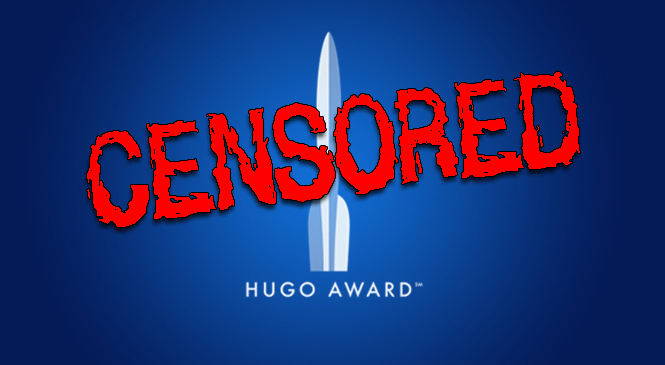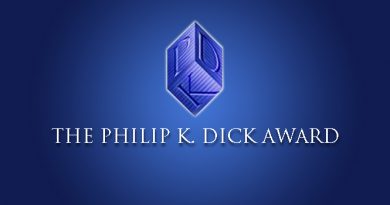More Hugo Award Controversy: Censorship Exposed

The Hugo Awards, once considered among the more prestigious achievements in science fiction, are mired in controversy yet again.
At the core of this particular round of concern: the apparent censorship of novels and media that were on the ballot for the 2023 Hugo Awards, and then were suddenly — and inexplicably — removed and deemed “ineligible” for reasons that have yet to be officially explained other than something about violating the World Science Fiction Society’s Constitution. Only, nothing specific from the Constitution has been cited, and the works rendered ineligible all seem to have something in common: some form of criticism of Communist China.
Let’s back up a bit.
The 2023 World Science Fiction Convention, known colloquially as “Worldcon”, was held in Chengdu, China. The location for the event changes every year, with organizations submitting bids to bring the event to their respective cities. The choices for 2023 were Chengdu along with Winnipeg in Canada, Nice in France, and Memphis, TN. Glasgow will host the 2024 event, and it will rotate to Seattle for 2025.
When the Chengdu selection was announced after a vote in 2021, over one hundred authors cried foul in an open letter, citing “serious and ongoing human rights violations taking place in the Uyghur region of China” that include the concentration camps where in the Chinese Communist Party has imprisoned many of the Uyghurs, who are the second-largest predominantly Muslim ethnicity in China — those same camps were very near the locations where Disney shot the live-action Mulan — and many announced that they would not be attending the event over those issues.
The letter reads, in part: “As science fiction and fantasy authors, we imagine brave new worlds in our fiction. We challenge power, authority and the status quo, where grave injustices may be perpetrated without accountability or reparation. We write underdogs and outsiders who disrupt power structures and overthrow cruel overlords.”
This was not the first time Worldcon had courted controversy, as the 2021 event in Washington, DC came under fire for having a sponsorship from Raytheon Technologies, an engineering company that contracts with the United States military. Prior to that, there were several years — most notoriously 2015 — where the “Sad Puppies” movement attempted to call attention to what they saw as ideological prejudice in the nomination process for the Hugos. In 2015, “No Award” won many categories as a coordinated snub to those nominees who had been championed by the movement.
Fast forward to 2023, with China pulling out all the stops — including the construction of a new science fiction museum commissioned to host the event. At over 65,000 square feet, the building is three times the size of the Sydney Opera House, and was completed in just twelve months. Many WSFS memberships were purchased in China, attributed to a high interest in science fiction on the mainland. It seemed that China was enthusiastically rolling out the red carpet for Worldcon.
Winners of the Hugos were announced in October, and unlike other years, the ballot information was not made public until January 20th. That’s when some discrepancies were noticed, as the ballot had several nominees marked “ineligible” with no explanation as to why. The New York Times bestseller Babel by R.F. Kuang, author Xiran Jay Zhao, and an episode of The Sandman were marked with an asterisk and left out of the final tally of votes.
Kuang posted on Bluesky that she was never given a reason for her novel being removed. “Until one is provided that explains why the book was eligible for the Nebula and Locus awards, which it won, and not the Hugos, I assume this was a matter of undesirability rather than ineligibility,” she wrote. “Excluding ‘undesirable’ work is not only embarrassing for all involved parties, but renders the entire process and organization illegitimate. Pity.”
After concerns were raised that the awards jury had censored certain nominees because of pressure from the Chinese Communist Party, jury head Dave McCarty wrote on Facebook: “Nobody has ordered me to do anything … There was no communication between the Hugo administration team and the Chinese government in any official manner.” Also on Facebook was the official response from the awards administration team: “After reviewing the constitution and the rules we must follow, the administration team determined those works/persons were not eligible.”
“I can only guess to why I was excluded, but it probably has something to do with my critical comments about the Chinese government in the past,” Zhao told The Guardian. “You would think that as a big, powerful country, China would be graceful about criticisms, but they in fact take it very personally, and doubly so when it’s from Chinese diaspora.” Zhao said that the Worldcon organizers should have taken the situation seriously from the beginning. “We knew something like this was going to happen.” Zhao has publicly spoken out against the Chinese government.
Paul Weimer, who was removed from the Best Fan Writer category, had expressed concerns about a gathering as large as Worldcon drawing the attention of the Chinese government, prompting their involvement and potential interference. Weimer had the third highest number of nominations on the ballot. “If the Chengdu Worldcon declared me ineligible at the direction of political or governmental parties outside of the Con, I forking need to know that,” Weimer wrote on Facebook.
Adam Morgan writing in Esquire on February 2nd, reports that “multiple former WorldCon committee members who spoke with me on the condition of anonymity do not believe the Chinese government—nor the Chinese members of last year’s Hugo Awards administration—directly or indirectly censored the awards. Rather, they believe that one or more members of the executive committee mismanaged this year’s awards—and failed to explain why four popular works were deemed ineligible.”
Now, it appears that it was indeed censorship, but from within the Worldcon organization itself, not the CCP. In a report on File 770, Chris Barkley and Jason Sanford report that e-mails leaked by Diane Lacey, who was part of the Hugo administration committee, confirm that McCarty had directed other members of the 2023 Hugo administrators to “highlight anything of a sensitive political nature” in China, including any works that focused “on China, taiwan, tibet or other topics that may be an issue *in* China.” (sic) Finalists should be vetted to make sure they would be safe to include on the ballot. In another e-mail, McCarty wrote, “I will try to get better guidance when I have a chance to dig into this deeper with the Chinese folks on the committee.” It’s still not clear whether or not McCarty was taking any “guidance” from the Chinese government.
Lacey confirmed with the New York Times that she had released the e-mails, saying she wanted to make certain the Hugos would not be compromised in the future. “I felt very guilty about what I did and wanted to be able to look myself in the mirror again,” she said. Lacey has served as administrator for the Hugos in 2009, 2011, and 2016, and was on the 2023 committee along with McCarty, Yalow, Shi, Ann Marie Rudolph, Joe Yao, Tina Wang, Dongsheng Guo, and Bo Pang. The e-mail chain appears to include only the Western administrators.
In an apology letter sent to File 770, Lacey wrote, “Let me start by saying that I am NOT making excuses, there are no adequate excuses. I am thoroughly ashamed of my part in this debacle, and I will likely never forgive myself. But the fans that have supported the Hugos, the nominees, and those that were unfairly and erroneously deemed ineligible in particular, deserve an explanation. Perhaps the only way I can even begin to ease my conscience is to provide one.”
In an e-mail dated June 5, 2023, McCarty wrote, “In addition to the regular technical review, as we are happening in China and the *laws* we operate under are different…we need to highlight anything of a sensitive political nature in the work. It’s not necessary to read everything, but if the work focuses on China, taiwan, tibet (sic), or other topics that may be an issue *in* China…that needs to be highlighted so that we can determine if it is safe to put it on the ballot if the law will require us to make an administrative decision about it.”
Kat Jones, who was also included in the e-mails, wrote about the Best Fan Writer category on June 7, “This category has the potential to be problematic, under the constraints you’ve listed, for most non-Chinese fan writers.” Jones was peripherally involved in the Hugo process, and she has since released her own statement and has resigned her position as Hugo administrator for the 2024 event in Glasgow. In her statement, she writes, “I was not involved in the evaluation of the data we flagged – and you’ll note in those emails we all expressed confusion over the vague instructions and had no idea whether anything we were mentioning was an actual problem. I had serious concerns at this point about this process. I stepped back and did no further work for the Chengdu Worldcon after the first pass of eligibility research.”
Lacey herself raised possible issues with regard to the Astounding Award for Best New Writer. In addition to concerns about Zhao, Lacey highlighted Naseem Jamnia and Sue Lynn Tan. Jamnia would make it to the final ballot, while Tan didn’t have enough nominations.
The e-mails provided to File 770 can be viewed here.
In the wake of the controversy, McCarty has resigned as Director of the Worldcon Intellectual Property, which is the legal entity that administers the World Science Fiction Society and the Hugo Awards. In addition to McCarty, Kevin Standlee has resigned as Chair of the Board of Directors. WIP has also censured or reprimanded McCarty, Standlee, Chen Shi, and Ben Yalow, both of whom presided over the Hugo Administration Committee for the 2023 event. Donald Eastlake has been chosen as the new Chair of the WIP Board. In a statement announcing the reprimands and resignations, WIP also notes there may be additional actions taken at a later date.
Esther MacCallum-Stewart, chair for the 2024 Glasgow Worldcon, also released a statement promising transparency in the next award cycle:
As Chair of Glasgow 2024, A Worldcon for Our Futures, I unreservedly apologise for the damage caused to nominees, finalists, the community, and the Hugo, Lodestar, and Astounding Awards.
Kat Jones has resigned with immediate effect as Hugo Administrator from Glasgow 2024 and has been removed from the Glasgow 2024 team across all mediums.
I acknowledge the deep grief and anger of the community and I share this distress.
I, and Glasgow 2024, do not know how any of the eligibility decisions for the Hugo, Lodestar and Astounding Awards held at the 2023 Chengdu World Science Fiction Convention were reached. We know no more than is already in the public domain.
At Glasgow 2024 we are taking the following steps to ensure transparency and to attempt to redress the grievous loss of trust in the administration of the Awards.
The steps we are committing to are:
1) When our final ballot is published by Glasgow 2024, in late March or early April 2024, we will also publish the reasons for any disqualifications of potential finalists, and any withdrawals of potential finalists from the ballot.
2) Full voting results, nominating statistics and voting statistics will be published immediately after the Awards ceremony on 11th August 2024.
3) The Hugo administration subcommittee will also publish a log explaining the decisions that they have made in interpreting the WSFS Constitution immediately after the Awards ceremony on 11th August 2024.
Glasgow 2024 will continue to address this matter as we go forward as a Worldcon.
Esther MacCallum-Stewart
Chair, Glasgow 2024, A Worldcon for Our Futures.
There is still a question as to whether or not officials from the Chinese Communist Party were involved at any level, and if they were in communication with McCarty regarding the “guidelines” the Hugo committee was using to vet nominees. File 770 notes that the American and Canadian members of the group were only looking into Western publications, with Chinese members examining the Chinese entries. In a now-deleted post, the Propaganda Department of the Sichuan Provincial Committee of the Communist Party of China said, “Three special groups reviewed the content of 1,512 works in five categories, including cultural and creative, literary, and artistic, that were shortlisted in the preliminary examination of the Chengdu World Science Fiction Convention, conducting strict checks on works suspected of being related to politics and ethnicity and religion, and putting forward proposals for the disposal of 12 controversial works related to LGBT issues.” Sichuan is the province where Chengdu is located.
McCarty has denied official involvement by the CCP, but in an e-mail dated June 7, he does mention a meeting with his Chinese counterpart to determine if any ballots are to be voided (this can happen for any number of reasons), noting that “The chairs and administrators will review the items we highlighted in research.” This would seem to indicate some form of censorship, whether it was self-censorship to avoid running afoul of local laws, or official censorship from agents of the Chinese Communist Party.
It should be noted that there is a bit of irony in the situation, given that the people who have run Worldcon in past years have exercised various forms of censorship against authors whose political leanings or social media posts didn’t align with those of the Worldcon organization, and the media coverage of this controversy has been notably without the hyperbole and hand-wringing that accompanied the coverage of the 2015 Sad Puppies campaign.
Jason Sanford, in his coverage of the controversy, writes without irony, “As detailed in the emails and files examined by myself and Chris Barkley, these Western administrators took it upon themselves to research political concerns about many of the finalists. I was one of those finalists they researched and let me tell you, this is the first time I’ve seen what amounts to a political dossier being created on what I’ve said and done. It’s not a good feeling.” Sanford, some may recall, wrote a series of articles critical of the private discussion forum known as “Baen’s Bar” on the web site for Baen Books, calling out specific posts for their political content.
Sanford’s co-author, Chris Barkley, writes, “I think that people in fandom, including the Chengdu Hugo Award admins, seem to have forgotten that the Hugos are not supposed to be a popularity contest but a merits-based award that is a judgment of the year’s best works of fiction and non-fiction. As such, it is up to the fans, who I might add, paid out of their own pockets for the privilege to nominate and vote on an annual basis, who should have the final word on who is honored.”
And as for Larry Correia, who instigated the very first Sad Puppies effort…
I just have to say that this whole current Hugo controversy has been incredibly amusing to me. 😀 https://t.co/GxPXIKSWKg
— Larry Correia (@monsterhunter45) February 15, 2024
![]()




